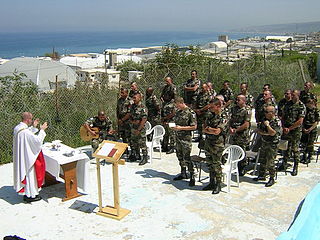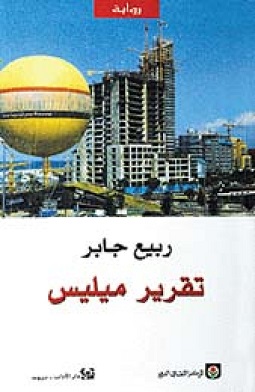
Rafic Bahaa El Deen al-Hariri was a Lebanese businessman and politician who served as prime minister of Lebanon from 1992 to 1998 and again from 2000 to 2004.

United Nations Security Council resolution 1559, adopted on 2 September 2004, after recalling resolutions 425 (1978), 426 (1978), 520 (1982) and 1553 (2004) on the situation in Lebanon, the Council supported free and fair presidential elections in Lebanon, urging the Lebanese government to establish control over its territory, disarm militias like Hezbollah, and facilitate the withdrawal of any remaining foreign forces from the country.
The "Report of the Fact-Finding Mission to Lebanon inquiring into the causes, circumstances and consequences of the assassination of former Prime Minister Rafik Hariri, 25 February - 24 March 2005", better known as the FitzGerald Report, is the outcome of an inquiry, ordered by the United Nations Secretary-General Kofi Annan and conducted by Irish deputy police commissioner Peter FitzGerald, into the assassination of former Lebanese Prime Minister Rafik Hariri on 14 February 2005.
The Mehlis Report is the result of the United Nations investigation into the 14 February 2005 assassination of Lebanon's former prime minister Rafik al-Hariri. The investigation was launched in accordance with UN Security Council Resolution 1595 and headed by the German prosecutor, Detlev Mehlis. It involved questioning Lebanese and Syrian officials.
Detlev Mehlis is the Senior Public Prosecutor in the Office of the Attorney General in Berlin. He has 30 years of prosecutorial experience and has led numerous investigations into serious, complex transnational crimes. He has been a senior public prosecutor since 1992 and has, over the course of his career, been responsible for prosecuting terrorism and organized crime cases. Most notably, he investigated the bombing on the discotheque La Belle in then West-Berlin in 1986, which claimed the life of two US soldiers and a Turkish woman, and uncovered the involvement of the Libyan intelligence service. He also proved the involvement of the terrorist Carlos and Syrian diplomats in the attack on the French culture centre Maison de France, also in West-Berlin, in 1983, as well as the involvement of Syrian intelligence services in the bombing of a German-Arab social center in Berlin in 1986. Since 1998, Mehlis has been the Chief of the Contact Office of the European Judicial Network and Coordinator for the fight against organized crime in the State of Berlin.

The Special Tribunal for Lebanon (STL), also referred to as the Lebanon Tribunal or the Hariri Tribunal, is a tribunal of international character applying Lebanese criminal law under the authority of the United Nations to carry out the investigation and prosecution of those responsible for 14 February 2005 assassination of Rafic Hariri, the former Lebanese prime minister, and the deaths of 21 others, as well as those responsible for connected attacks.

United Nations Security Council Resolution 1636, adopted unanimously on 31 October 2005, after recalling resolutions 1373 (2001), 1566 (2004) and 1595 (2005), the council insisted that the Syrian authorities fully co-operate with the inquiry of the United Nations International Independent Investigation Commission (UNIIIC) into the assassination of former Lebanese Prime Minister Rafic Hariri, not least by arresting the suspects identified by the commission in its final report.
Walid Eido was a member of the Future Movement, Lebanese political movement and a member of the Lebanese Parliament. He was also a member of the March 14 Coalition.
The United Nations International Independent Investigation Commission (UNIIIC) was established on 7 April 2005 by Security Council Resolution 1595 to investigate the assassination of former Prime Minister of Lebanon, Rafic Hariri, who had been killed in Beirut on 14 February 2005.

On 14 February 2005, former Prime Minister of Lebanon Rafic Hariri was assassinated along with 21 others in an explosion in Beirut, Lebanon. Explosives equivalent to around 1,000 kilograms of TNT were detonated as his motorcade drove near the St. George Hotel. Among the dead were several of Hariri's bodyguards and former Minister of Economy and Trade, Bassel Fleihan.

United Nations Security Council resolution 1595, adopted unanimously on 7 April 2005, after recalling its support for the sovereignty, territorial integrity and independence of Lebanon, the council established a commission to assist Lebanese authorities in their investigation of the assassination of former Prime Minister Rafic Hariri in Beirut on 14 February 2005.

United Nations Security Council Resolution 1644, adopted unanimously on 15 December 2005, after recalling resolutions 1373 (2005), 1566 (2004), 1595 (2005) and 1636 (2005), the Council demanded that Syria respond to the inquiry of the United Nations International Independent Investigation Commission (UNIIIC) into the assassination of former Lebanese Prime Minister Rafic Hariri, and extended the investigation until 15 June 2006.

United Nations Security Council Resolution 1664 was adopted unanimously on March 29, 2006; after recalling resolutions 1595 (2005), 1636 (2005) and 1644 (2005), the Council requested the Secretary-General Kofi Annan to consult with the Lebanese government concerning the establishment of an international tribunal to try those responsible for the assassination of Prime Minister Rafic Hariri and 22 others in February 2005.

United Nations Security Council Resolution 1748 was unanimously adopted on 27 March 2007.

United Nations Security Council Resolution 1786 was unanimously adopted on 28 November 2007.

United Nations Security Council Resolution 1815 was unanimously adopted on 2 June 2008.

United Nations Security Council Resolution 1852 was unanimously adopted on 17 December 2008.

Jamil Al Sayyed is a Lebanese politician and a current Member of the Parliament of Lebanon. He is the former head of Lebanon's Sureté Générale or Lebanese General Security Directorate. He was detained and released after four years, from 2005 to 2009 according to a law he drafted himself, due to his alleged involvement in the assassination of former Lebanese prime minister Rafik Hariri.
Ali Al Hajj is a former major general and ex-director general of the Lebanese Internal Security Forces.

The Mehlis Report is a book by Lebanese author Rabee Jaber. Published in 2005 in Arabic by Jaber, it tells the story of an architect, Saman Yarid, who is waiting for the United Nations' Mehlis Report to be released in late 2005. The Mehlis Report takes the reader on a journey through Lebanese history regarding the lead up to the release of German prosecutor Detlev Mehlis’ report to the United Nations on October 21, 2005 regarding the February 14, 2005, car bombing assassination of Lebanon’s former Prime Minister Rafik Hariri.












